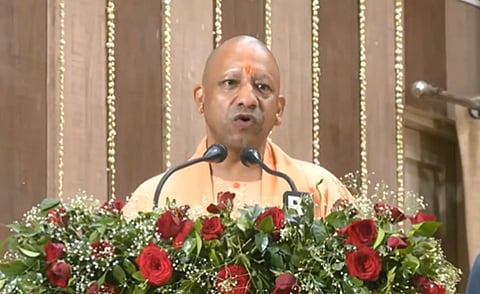

LUCKNOW: Creating a few ripples, UP CM Yogi Adityanath, on Saturday, called Gyanvapi the real embodiment of Lord Vishwanath himself. He said it was ‘unfortunate’ that people associated the name with a mosque, referring to the Gyanvapi Mosque in Varanasi.
“Unfortunately, people call Gyanvapi a mosque, but it is actually ‘Baba Vishwanath’ (Lord Shiva) himself,” said Yogi while addressing the inaugural session of an international seminar on the 'Contribution of Nathpanth in the Creation of a Harmonious Society' at Deendayal Upadhyay Gorakhpur University.
CM Yogi’s statement has come close to the order of the Varanasi court on the Gyanvapi case on Thursday, wherein, the court rejected a petition from the Hindu side seeking repairs to the basement of ‘Vyas Ji ka Thekhana’ on the Gyanvapi mosque premises.
Later, the CM’s remarks were posted on his official social media handle as: “Today people call Gyanvapi a mosque in other words, but Gyanvapi is actually Lord Vishwanath personified.”
Yogi Adityanath added that the devotees visiting the site feeling confused about its true identity or name was the biggest obstacle not only to worship and offering prayers but also to national unity and integrity. Meanwhile, the first reaction to Yogi Adityanath’s statement over Gyanvapi came from Maulana Shahabuddin Razvi of All India Muslim Jamat.
The Muslim cleric said that UP CM’s statement was against the decorum of the chair of the chief minister.
He said that Gyanvapi was a historical mosque and that he did not agree with CM Yogi's statement. “He is the CM for the entire state irrespective of section which supports him and those who do not,” said Maulana.
The cleric said that Namaz was being offered at Gyanvapi for ages and it was a well-known mosque.
However, earlier during the discourse, CM Yogi recounted a legend about Lord Shiva testing the spiritual evolution of Adi Shankaracharya, who was visiting Kashi after establishing spiritual centres in all four corners of India.
Elaborating on the tradition of saints and sages and describing them as a force that united society and the nation, Yogi delved in detail about Adi Shankaracharya, who was born in Kerala and established key Peethas for the expansion of religion and spirituality across the country.
"When Adi Shankaracharya arrived in Kashi, Lord Vishwanath sought to test him. As the sage and spiritual guru went to bathe in holy river Ganga during Brahma Muhurta, Lord Vishwanath appeared before him disguised as an untouchable. When Adi Shankaracharya asked him to step aside, Lord Vishwanath, still in that form, challenged him, saying that if the hermit was truly full of Advaita knowledge, he should not see people only as the physical body. If Brahma is the ultimate truth, then the same brahma resides in me also as he is there in you," said Lord Shiva disguised as an untouchable.
CM Yogi added: “When stunned Adi Shankara asked the untouchable for his real identity, Lord Shiva came into his real being revealing to him that he was the one for whose worship (Adi Shankara) had gone to Gyanvapi in Kashi." The CM then concluded that Gyanvapi was a real embodiment of Lord Vishwanath.
Stating that the tradition of Indian sages and saints with special reference to Nathpanth to which Yogi Adityanath himself belongs, had valued an egalitarian and harmonious society since ancient times, the UP CM said: "Our saints and sages have consistently emphasized that physical untouchability is not only a barrier to spiritual practice but also an obstacle to national unity and integrity."
The Chief Minister further noted that if more attention had been paid to eliminate untouchability, the country would have never been enslaved. "The tradition of saints never prioritized untouchability within society, and this is also the ethos of the Nathpanth. The Nathpanth respects all castes, sects, religions, and regions, striving to bring everyone together." He added that the Nath sect, on one hand, focused on spiritual elevation through physical purification, while on the other, it would make efforts to unify every section of society.
He noted that the enduring influence of Nathpanth was evident not only across India but also internationally. He recounted his meeting with a prominent saint from Tamil Nadu in Ayodhya, who provided manuscripts of Nathpanth from remote areas of Tamil Nadu. "Many places of worship and traditions linked to Gorakhnath Ji still exist", remarked Yogi Adityanath on the occasion which also marked the memorial of his Guru Mahant Awaidyanath who had left for his heavenly abode on September 12, 2014.
He observed that Nathpanth tradition was expanding in states like Maharashtra, Punjab, Sindh, Tripura, Assam, Bengal, and beyond Greater India, including Nepal, Bangladesh, Tibet, Afghanistan, and Pakistan.